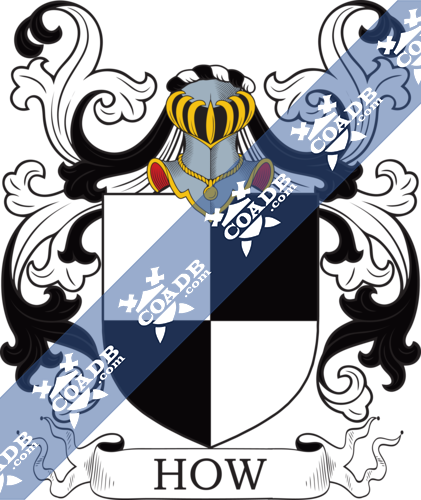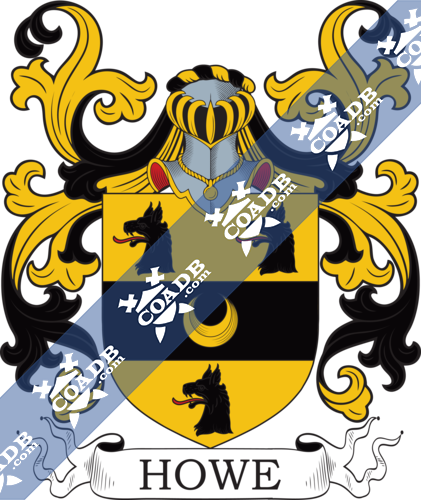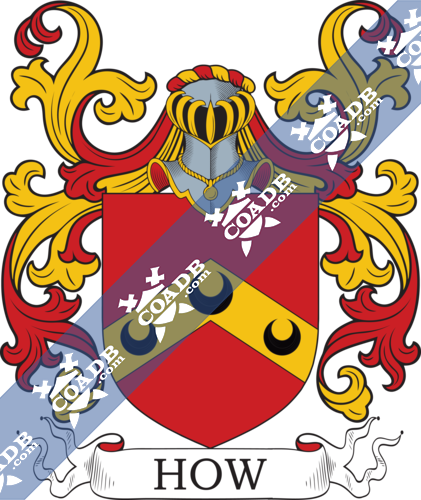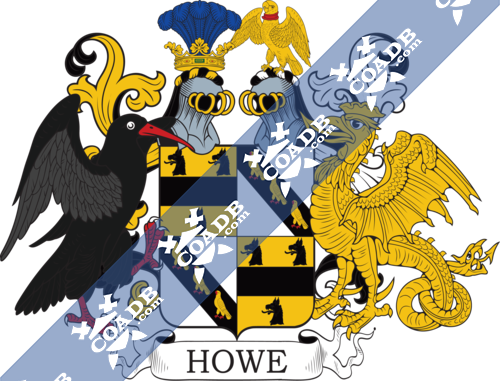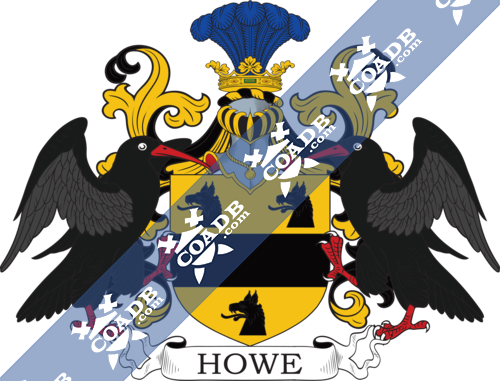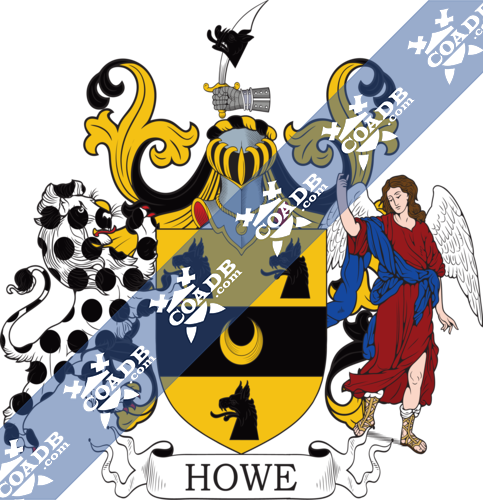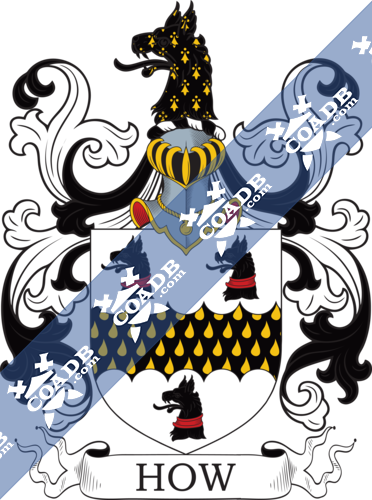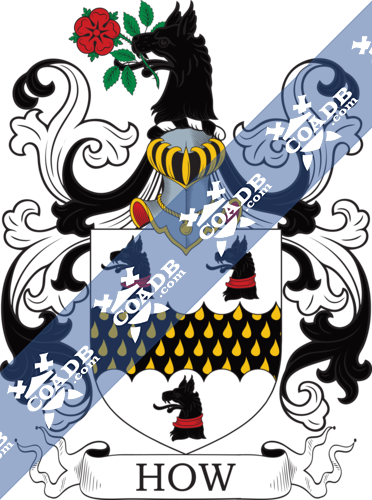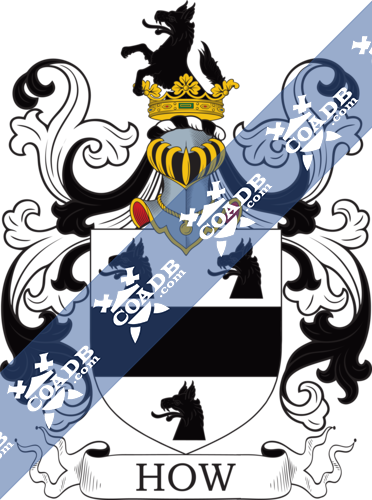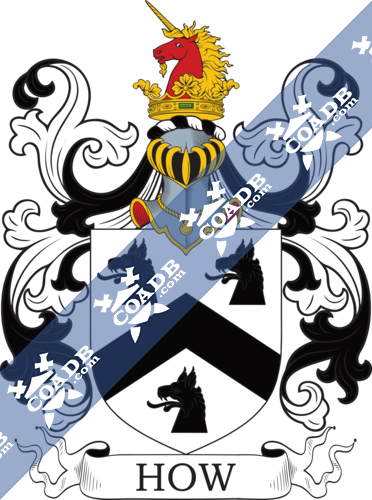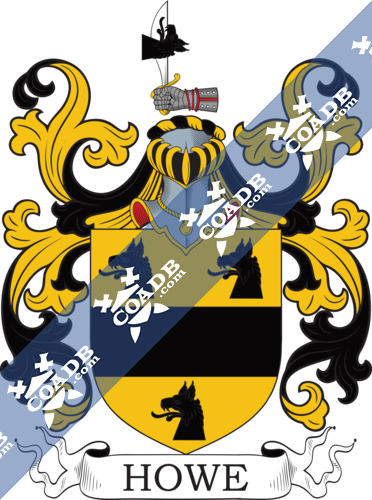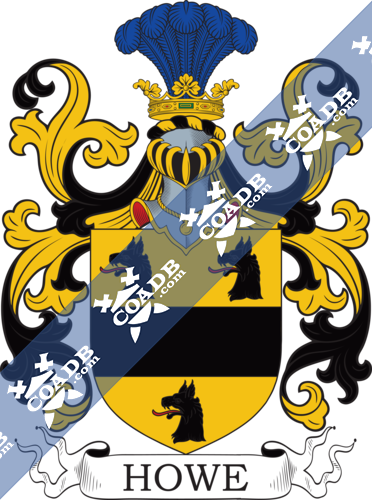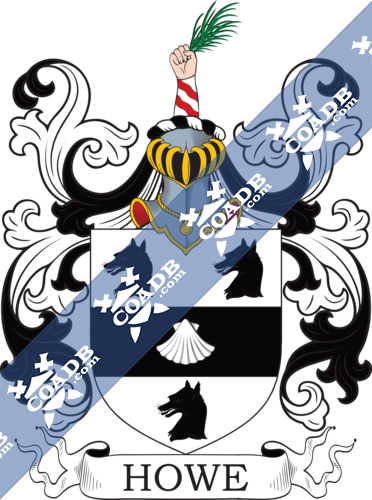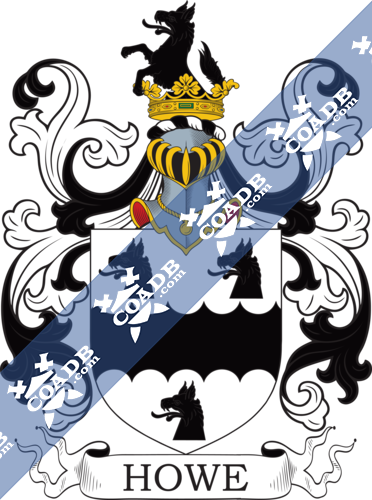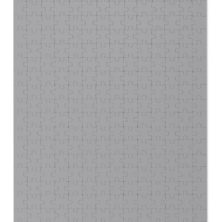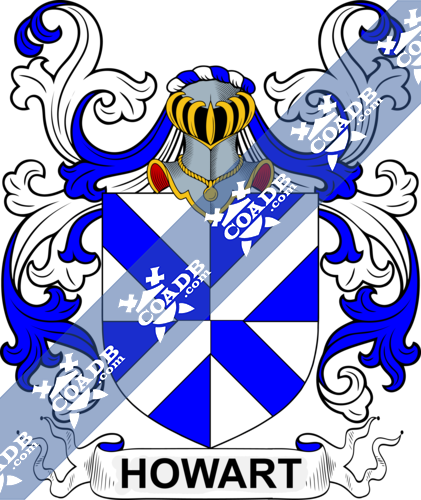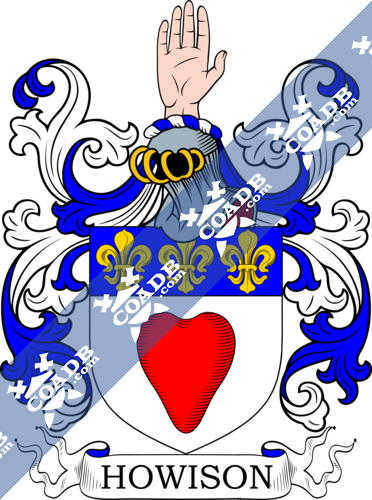Howe Family Crest, Coat of Arms and Name History
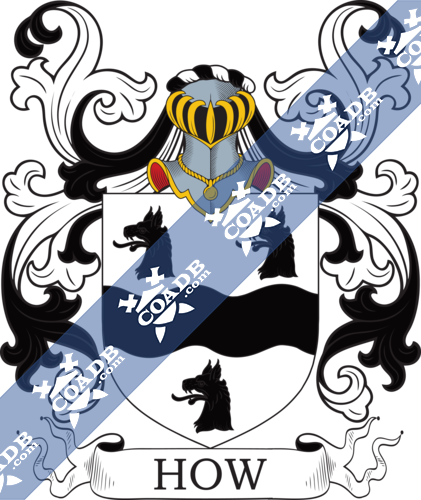
Howe Coat of Arms Gallery
Don’t know which Coat of Arms is yours?
We can do a genealogical research. Find out the exact history of your family!
Learn MoreMeaning, Origin, Etymology
Howe is a name of ancient Anglo-Saxon origin and comes from the family once having lived near a hill or steep ridge of land. The surname Howe is usually derived from the Old English word hoh, which means heel or projecting ridge of land
Howe is a name of ancient Anglo-Saxon origin and comes from the family once having lived near a hill or steep ridge of land. However, it is sometimes derived from the Old Norse word haugr, which means mound or hill. Furthermore, the name Howe may be derived from residence in one of a variety of similarly named places: Hoe is in Norfolk; Hoo is in Kent; places called Hooe are in Devon and Sussex; Hose is in Leicestershire; places named Heugh are in Durham and Northumberland; and settlements called Hough are found in both Cheshire and Derby. The name could have also have been derived from an association with a person such as the ‘son of Hugh’.
Spelling Variations
Howe, Howes, How, Howse, Howell, Hows, Hove, Hough, Hoey, Haughey, Hoy, How, Hoe, Hoo, Howan, Howin, and Howen. Patronymic forms: Hows, Howson, Howison, and Howes
Popularity & Geographic Distribution
The last name Howe ranks 5,565th in popularity in terms of the world, as of the 2014 Census and approximately 98,230 people carry the Howe surname. The name ranks particularly high in the following six states: California, New York, Florida, Texas, Michigan and Illinois. The surname is very frequent in the United States, where it ranks 743rd . It ranks highest in the following countries: United States (approx. 49,000), England (approx. 17,000), Canada (approx. 6,500), Austrralia (approx. 6,000), Liberia (approx. 4,000), South Africa (approx. 1,900), Germany (approx. 1,800), and Wales (approx. 1,300) [13]
Early Bearers of Surname
- William de Ho. This was dated 1121 in the Danel Law Feudal Documents, for the county of Essex
- Sir James Howe, 2nd Baronet (c. 1669–19 Jan 1736) Extinct on his death, was an English politician who sat in the House of Commons between 1698 and to 1705.
- Sir John Howe, 1st Baronet (died c.1671)an English politician who sat in the House of Commons from 1654 to 1656
- Sir Richard Grobham Howe, 2nd Baronet (28 August 1621–3 May 1703) was an English politician who sat in the House of Commons at various times between 1656 and 1695.
- Sir Richard Grobham Howe, 3rd Baronet (c.1652–3 July 1730) He was a Member (MP) of the Parliament of England for Hindon in the period October 1679 – January 1681, for Tamworth in 1685–1687, for Cirencester in 1690–1698 and for Wiltshire in February–November 1701 and 1702–1727
- Sir Emanuel Scrope Howe, 4th Baronet (c.1700–29 March 1735) Baronetcy merged with Howe Viscountcy in 1730. Both extinct in 1814. was a British politician and colonial administrator. He was member of parliament for Nottinghamshire from 1722 to 1732. [6,7,8,9,11,12]
History, Genealogy & Ancestry
The Howe surname was first found in Berkshire, where the name has geographical significance as in the south: a small round hill and in the north: a hollow place or plain, another reference for the surname could also have been a baptismal name as in Son of Hugh. De La Howe ‘from the hill’ was originally the name of the family. They came to England with William the Conqueror. The medieval form of the name is ‘At How’ and is usually referred to as a Hill having derived from the Anglo-Saxon ‘how’ meaning a mountain. However we must look to Cambridgeshire to find the first listing on the name where Roger del Howes and Richard del Howes were listed there in the Hundredorum Rolls of 1273. At the church of Withington, Gloucestershire there stands a monument to the memory of Sir John How(e), his wife and nine children, in a small cross aisle on the south side of the church, the burial place of the family. [5]
There have been two baronetcies created for persons with the surname of Howe. Both baronetcies were in the Baronetage of England and both are now extinct. The first is the Howe Baronetcy, of Cold Barwick in the County of Wiltshire, which was created in the Baronetage of England on 20 June 1660 for George Grobham Howe, who was a Member of Parliament for Hindon from 1660 to 1667. His son Sir James Howe was the 2nd Baronet and was also a Member of Parliament for Hindon. The second is the Howe Baronetcy, of Compton in the County of Gloucester, which was created in the Baronetage of England on 22 Septemeber 1660 for John Howe who was a Member of Parliament for Gloucestershire from 1654 to 1655 and 1656 to 1658. His eldest son Richard was the 2nd Baronet and was also a Member of Parliament, as was his younger son John Grobham Howe who died in 1679. Sir Richard Grobham Howe was the 3rd Baronet, and was a Member of Parliament for Tamworth, Cirencester and Wiltshire. Sir Emanuel Scrope Howe was the 4th Baronet and also became the 2nd Viscount Howe upon the death of his father in 1713 and the baronetcy which he inherited from his father was merged with his viscountcy in 1730. [9]
Richard Howe, 1st Earl Howe (Admiral of the Fleet) (8 March 1726 – 5 August 1799) was a British Naval Officer. He served in the War of the Austrian Succession and gained a reputation for his role in operations where he would attack from the sea to land against the French coast as part of Britain’s policy of naval descents during the Seven Years’ War. He was also a Naval Captain, in the British Naval Victory at the Battle of Quiberon Bay in November 1759. In North America, Howe is best known for his service during the American Revolutionary War, when he acted as a naval commander and a peace commissioner with the American rebels. Within American documents he is referred to as Lord Howe. He also conducted a successful relief mission during the Great Siege of Gibraltar in the later stages of the War. In January 1755 he was given command of the fourth-rate HMS Dunkirk and was sent to North America as part of a squadron commanded by Admiral Edward Boscawen. He was elected to as a Member of Parliament for Dartmouth in May 1757 and became the commanding officer of the third-rate HMS Magnanime. From 1757 to 1763 he served in the Channel in various expeditions against the French coast, gaining a reputation as a firm and skillful officer. After the death of his elder brother, who was killed near Ticonderoga on 6 July 1758, Howe became Viscount Howe in the Peerage of Ireland. Howe was appointed to the Board of Admiralty led by John Mantagu, 4th Earl of Sandwich as Senior Naval Lord in April 1763. He became Treasurer of the Navy in 1765 and then was promoted to rear admiral on 18 October 1770. He went on to be Commander-in-Chief of the Mediterranean Fleet in November 1770. He was then promoted to Vice Admiral on 5 February 1776 and the became Commander-in-Chief of the North American Station a month later. Howe became the First Lord of the Admiralty in January 1783 during the Earl of Shelburne’s minstry, resigning in April of 1783 when the Duke of Portland came to power and being re-appointed in December 1783 under the Younger Pitt’s first ministry. By 1788 Howe grew tired of this position and he resigned his post as First Lord despite efforts to persuade him to stay. To show their goodwill and approval of him, the government awarded Howe an Earldom on 22 July 1788. He commanded the victorious British fleet during the Glorious First of June in June 1794 during the French Revolutionary Wars. In May of 1797 he was called on to pacify Spithead mutineers where he spent twelve hours being rowed around the fleet and speaking to each of the men. Following this peace was once again restored. For this he was appointed a Knight of the Order of the Garter on 2 June 1797. Howe died at his home at 11 Grafton Street in London on 5 August 1799 and was buried in his family vault at St. Andrew’s Church, Langar in Nottinghamshire. [8]
Earl Howe is a title that has been created twice in British history, for members of the Howe and Curzon-Howe family.
The first creation, in the Peerage of Great Britain, was in 1788 for Richard Howe, but became extinct on his death in 1799. The second creation, in the Peerage of the United Kingdom was in 1821 for Richard Curzon, and remains current. The first creation was in 1788 for Richard Howe, he is descended from John Grobman Howe, of Langar, Nottinghamshire. He married Annabella, illegitimate daughter of Emanuel Scrope, 1st Earl of Sunderland. Their son, Scrope Howe, sat as a Knight of the Shire for Nottinghamshire. In 1701 he was raised to the Peerage of Ireland as Baron Glenawley and Viscount Howe. The second Viscount also represented Nottinghamshire in the House of Commons and served as Governor of Barbados. He married Charlotte, Baroness von Kielmansegg, niece of George I. Her mother was the illegitimate half-sister of the King. Lord Howe was succeeded by his son, the third Viscount. He was a Brigadier-General in the British Army and was killed during the Battle of Carillon in 1758. He was succeeded by his younger brother, Richard, the fourth Viscount. He was a distinguished naval commander best known for his victory of the Glorious First of June in 1794. In 1782 Howe was created Viscount Howe, of Langar in the County of Nottingham, in the Peerage of Great Britain, which entitled him to a seat in the House of Lords. In 1788 he was further honoured when he was made Baron Howe, of Langar in the County of Nottingham, with him having no male heirs of his ownLord Howe’s Viscountcy and Earldome became extinct upon his death in 1799. He was succeeded in the barony of Howe according to the special remainder by his eldest daughter Sophia Charlotte. The Irish titles passed to his younger brother, William, the fifth Viscount. He was a noted soldier and served as Commander-in-Chief of the Forces in North America during the American Revolutionary War. He had no surviving issue and on his death in 1814 the barony of Glenawly and viscounty of Howe became extinct.
The second creation, in the Peerage of Great Britain, was in 1821 for Lady Sophia Charlotte which is mentioned above, who succeeded her father as second Baroness Howe in 1799, married the Hon. Penn Curzon, Member of Parliament for Clitheroe. He was the only son of Assheton Curzon, second son of Sir Nathaniel Curzon, 4th Baronet, of Kedleston (ancestor of George Curzon, 1st Marquess Curzon of Kedleston, and the Barons and Viscounts Scarsdale; see Viscount Scarsdale for earlier history of the family). Assheton Curzon represented Clitheroe in the House of Commons for twenty-seven years. In 1794 he was raised to the Peerage of Great Britain as Baron Curzon, of Penn in the County of Buckingham, and in 1802 he was further honoured when he was made Viscount Curzon, of Penn in the County of Buckingham, in the Peerage of the United Kingdom. Lord Curzon was succeeded by his grandson, the second Viscount. He was the only son of Penn Curzon and Lady Howe. In 1821 he assumed by Royal licence the additional surname of Howe and the same year the earldom held by his maternal grandfather was revived when he was created Earl Howe in the Peerage of the United Kingdom. In 1835 he also succeeded his mother as third Baron Howe. He was succeeded by his eldest son, the second Earl. He sat as Conservative Member of Parliament for Leicestershire South. He died without male issue and was succeeded by his younger brother, the third Earl. He was a General in the British Army. His eldest son, the fourth Earl, was a Conservative politician and held minor office in the Conservative administration of 1895 to 1905. On his death in 1929 the title passed to his eldest son, the fifth Earl. He was a Conservative Member of Parliament and also involved in the world of motor racing. His only son, the sixth Earl, had four daughters but no sons and on his death in 1984 the line of the fourth Earl failed. The late Earl was succeeded by his second cousin, the seventh Earl and (As of 2016) present holder of the titles. He is the only son of the actor George Curzon, son of the Hon. Frederick Graham Curzon-Howe, second son of the third Earl. Lord Howe held office from 1991 to 1997 in the Conservative administrations of John Major. He is now one of the ninety elected hereditary peers that remain in the House of Lords after the passing of the House of Lords Act 1999. As a descendant of Sir Nathaniel Curzon, 4th Baronet, of Kedleston, he is also in remainder to this title, which is held by his kinsman the Viscount Scarsdale. Within this family other members of the Curzon-Howe family have also gained distinction. The Hon. Frederick Howe (1823–1881), third son of the first Earl, was a Captain in the Royal Navy. The Hon. Ernest George Howe (1828–1885), sixth son of the first Earl, was a Colonel in the British Army. The Hon. Sir Leicester Smyth (1829–1891) (who assumed the surname of Smyth in 1866), seventh son of the first Earl, was a General in the British Army and served as Governor of Gibraltar. The Hon. Montagu Curzon (1846–1907), eighth son of the first Earl (and eldest from his second marriage), was a Colonel in the Rifle Brigade and Member of Parliament. The Hon. Sir Assheton Curzon-Howe, ninth son and youngest child of the first Earl, was a naval commander and served as Commander-in-Chief of the Mediterranean Fleet from 1908 to 1910. His eldest son Leicester Charles Assheton St John Curzon-Howe (1894–1941) was a Captain in the Royal Navy. Lady Mary Anna Curzon, only daughter of the second marriage of the first Earl, married James Hamilton, 2nd Duke of Abercorn. Their granddaughter Lady Cynthia Hamilton married Albert Spencer, 7th Earl Spencer, and was the grandmother of Diana, Princess of Wales. The aforementioned George Curzon, son of the Hon. Frederick Graham Curzon-Howe, second son of the third Earl, was an actor. The family seat is Penn House, Penn Street, Buckinghamshire. [11]
Julia Ward Howe born May 27, 1819 and died October 17, 1910 was an American poet and author, best known for writing “The Battle Hymn of the Republic.” She was also an advocate for abolitionism and was a social activist, particularly for women’s suffrage. She was inspired to write “The Battle Hymn of the Republic” after she and her husband visited Washington, D.C., and met Abraham Lincoln at the White House in November 1861. During the trip, her friend James Freeman Clarke suggested she write new words to the song “John Brown’s Body“, which she did on November 19. The song was set to William Steffe‘s already-existing music and Howe’s version was first published in the Atlantic Monthly in February 1862. It quickly became one of the most popular songs of the Union during the American Civil War. As she was now in the public eye, she produced eleven issues of the literary magazine ‘Northern Lights’ in 1867.
That same year she wrote about her travels to Europe in From the Oak to the Olive. After the war she focused her activities on the causes of pacifism and women’s suffrage. By 1868, Julia’s husband no longer opposed her involvement in public life, so Julia decided to become active in reform. She helped found the New England Women’s Club and the New England Woman Suffrage Association. She served as president for nine years beginning in 1868. In 1869, she became co-leader with Lucy Stone of the American Woman Suffrage Association. Then, in 1870, she became president of the New England Women’s Club. After her husband’s death in 1876, she focused more on her interests in reform. She was the founder and from 1876 to 1897 president of the Association of American Women, which advocated for women’s education. She also served as president of organizations like the Massachusetts Woman Suffrage Association and the New England Suffrage Association. In 1872 she became the editor of Woman’s Journal, a widely-read suffragist magazine founded in 1870 by Lucy Stone and Henry B. Blackwell. She contributed to it for twenty years. That same year, she wrote her “Appeal to womanhood throughout the world”, later known as the Mother’s Day Proclamation, which asked women around the world to join for world peace. (See Category:Pacifist feminism.) She authored it soon after she evolved into a pacifist and an anti-war activist. In 1872, she asked that “Mother’s Day” be celebrated on the 2nd of June. Her efforts were not successful, and by 1893 she was wondering if the 4th of July could be remade into “Mother’s Day”. In 1874, she edited a coeducational defense titled Sex and Education. She wrote a collection about the places she lived in 1880 called Modern Society. In 1883, Howe published a biography of Margaret Fuller. Then, in 1885 she published another collection of lectures called Is Polite Society Polite? (“Polite society” is a euphemism for the upper class.) In 1899 she published her popular memoirs, Reminiscences. She continued to write until her death. In 1881, Howe was elected president of the Association for the Advancement of Women. Around the same time, Howe went on a speaking tour of the Pacific coast, and founded the Century Club of San Francisco. In 1890, she helped found the General Federation of Women’s Clubs, to reaffirm the Christian values of frugality and moderation. From 1891-1893, she served as president for the second time of the Massachusetts Woman Suffrage Association. Until her death, she was president of the New England Woman Suffrage Association. From 1893 to 1898 she directed the General Federation of Women’s Clubs, and headed the Massachusetts Federation of Women’s Clubs. In 1908 Julia was the first woman to be elected to the American Academy of Arts and Letters, a society; its goal is to “foster, assist, and sustain excellence” in American literature, music, and art. Howe died of pneumonia October 17, 1910, at her Portsmouth home, Oak Glen at the age of 91. She is buried in the Mount Auburn Cemetery in Cambridge, Massachusetts. At her memorial service approximately 4,000 individuals sang “Battle Hymn of the Republic” as a sign of respect as it was the custom to sing that song at each of Julia’s speaking engagements. After her death, her children collaborated on a biography, published in 1916. It won the Pulitzer Prize for Biography. Some of the honors that she has bestowed upon her were the following:
- On January 28, 1908, at age 88, Howe became the first woman elected to the American Academy of Arts and Letters. Howe was inducted posthumously into the Songwriters Hall of Fame in 1970.
- She has been honored by the U.S. Postal Service with a 14¢ Great Americans series postage stamp issued in 1987.
- The Julia Ward Howe School of Excellence in Chicago’s Austin community is named in her honor.
- The Howe neighborhood in Minneapolis, MN was named for her.
- The Julia Ward Howe Academics Plus Elementary School in Philadelphia was named in her honor in 1913.
- Her Rhode Island home, Oak Glen, was added to the National Register of HistoriPlaces in 1978.
- Her Boston home is a stop on the Boston Women’s Heritage Trail. [10]
Early American Immigration and New World Settlers
- Rice Howe, who settled in Virginia in 1618
- Rice Howe, who arrived in Virginia in 1618
- Daniel Howe, who landed in Lynn, Massachusetts in 1634
- Edward Howe, who landed in Lynn, Massachusetts in 1635
- Elizabeth Howe, aged 50, who landed in New England in 1635
- David Howe, who arrived in Boston, Massachusetts in 1764
- George Howe, who arrived in New York, NY in 1811
- William Howe, aged 25, who landed in New York in 1812
- Michael Howe, who landed in Charleston, South Carolina in 1813
- Eberh W Howe, who arrived in America in 1834
- E C Howe, who landed in San Francisco, California in 1851
- Ralph Marcus Howe, who landed in Wisconsin in 1922 [7]
Mottoes
- “Stat Fortuna Domus” translated as: ‘Good Fortune to this House’
- “Let Curzon holde what Curzon helde”
- “Utcunque placuerit Deo”translated as: ‘as it shall please God’
- “Justus et propositi tenax” translated as: ‘just and firm of purpose’
Grantees
- How, Annabella, wife of John Graham Howe 1663
- Curzon-Howe, Viscount of County Nottingham (7 July 1821)
- Howe, Viscount Crest of Scrope
- Howe, Major, Gen, Hon. William K.B. (13 October 1776)
- Howe, Baroness, Widow of Curzon
- Howe, Lient. Col. Stephens; A.D.C. to the King of Mistley Thorned County of Essex [8]
Notables
- Albion P. Howe, American Union Army general during the American Civil War.
- Andrew Howe (born 1985), American-born, Italian athlete
- Anthony Howe (disambiguation)
- Anthony Howe (historian), English historian
- Anthony Howe (sculptor) (born 1954), American artist
- Art Howe, American professional baseball player and manager
- Arthur Joseph Christopher Howes (1950 – 2004) – Film maker
- Captain Victor Tolubiev Howes (1822 – 1907) – Sailor and artist
- Dr Henry William Howes, C.M.G., O.B.E., M.A., M.Sc. (1896 – 1978) – Educator
- Edward Howes (1813 – 1871) – Member of Parliament
- Henry Alonzo House (1840-1930) – Inventor
- John William Howes (1864 – 1954) – Schoolteacher and sportsman
- Justin Howes (1963 – 2005) – Typographer
- Lance-Corporal William John House (1879 – 1912) – winner of the Victoria Cross
- Major-General Frederick Augustus Howes (1835 – 1887) – 19th century soldier
- Major-General Sir Neville Reginald Howse, V.C., K.C.B., K.C.M.G. (1863 – 1930) – First Aussie winner of the Victoria Cross
- Private Augustus Howes (1889 – 1917) – Died for his country
- Ronald Howes (1926 – 2010) – Inventor
- Royal Earl House 1814 – 1895 – Inventor
- Sally Ann Howes (1930 – ) – Actress
- Sergeant-Major John Howes (1828 – 1902) – Balaclava veteran
- Seth Benedict Howes (1815 – 1901) – Circus owner, entrepreneur and showman
- Sir Henry Greenway Howse (1841 – 1914) – Surgeon
- Thomas Howes (c1590 – 1665) – First Howes immigrant to the US
- Brian Howe (politician), Australian politician
- Brigadier-General William Francis Howe (1888-1952), American Professor at Yale University (1943)
- C. D. Howe, Canadian politician
- Daniel Walker Howe (born 1937), American historian
- Darcus Howe (born 1943), British broadcaster and columnist
- David Howe (speedway rider), British motorcycle speedway rider
- David J. Howe (born 1961), British writer, journalist, publisher, and media historian
- Denis Howe (born 1928), English footballer
- Denis Howe (editor), editor
- Don Howe (1935–2015), English footballer
- Don Howe (footballer, born 1917) (1917–1978), English footballer of the 1930s, ’40s and ’50s
- Donald “Don” Howe (1935-2015), English football player, coach, manager and pundit
- Dylan Howe (born 1969), English jazz drummer
- Eddie Howe, football manager and former English football player
- Edgar Watson Howe, American novelist
- Elias Howe (1819-1867), American inventor credited with inventing the first practical sewing machine
- Elias Howe (1819–1867), American inventor of the sewing machine
- Elliot C. Howe (1828–1899), American botanist
- Frederic C. Howe, Ohio Senator and commissioner of Ellis Island
- Geoffrey Howe (1926–2015), British politician, Chancellor of the Exchequer under Margaret Thatcher
- George Howe (architect) (1886–1955), American architect
- George Howe, 3rd Viscount Howe (1725–1758), British general in French and Indian War
- George William Osborn Howe (1875–1960), British electrical engineer
- Gilman Bigelow Howe (1850–1933), American genealogist
- Gordie Howe (1928–2016), Canadian Hall of Fame winger
- Greg Howe (born 1963), American musician
- Henry Marion Howe, (1848–1922), American metallurgist
- Herbert Alonzo Howe (1858–1926), American astronomer and educator
- Irving Howe (1920–1993) American literary and social critic
- Jackie Howe (1861–1920) Australian sheep shearer
- James Wong Howe (1899-1976), American cinematographer nominated for ten Academy Awards for cinematography, winning twice; he worked on over 130 films
- James Wong Howe (1899–1976) Chinese-born American cinematographer
- John Howe (illustrator) (born 1957), Canadian illustrator
- John Howe (theologian) (1630–1705), English Puritan theologian
- Joseph Howe (1804–1873), Nova Scotia politician
- Josias Howe (c.1611–1701), English divine
- Julia Ward Howe (1819–1910), American reformer
- Les Howe (1895–1976), American baseball player
- Linda Moulton Howe (born 1942), American investigative journalist and documentary maker
- Louis McHenry Howe (1871-1936), political advisor to President Franklin D. Roosevelt
- Louis McHenry Howe (1871–1936), political advisor to President Franklin D. Roosevelt
- Mark Howe (born 1955), younger son of Gordie, American–Canadian Hall of Fame winger and defenceman
- Marshall Avery Howe (1867–1936), American botanist
- Marty Howe (born 1954), older son of Gordie, American–Canadian defenceman
- Mary Howe (1882–1964), American composer and pianist
- Mary Howe (singer) (1870–1952), American operatic soprano
- Michael Howe (bushranger) (1787–1818), Australian bushranger
- Michael Howe (psychologist) (1940–2002), British cognitive psychologist
- Mike Howe (born 1965), American musician
- Neil Howe (born 1951), American historian, economist and demographer
- Paul Howe (born 1968), British swimmer
- Richard Howe (1726-1799), British admiral known for his service during the American War of Independence and French Revolutionary Wars, made 1st Earl Howe in 1788
- Richard Howe, 1st Earl Howe (1726–1799), British admiral in American Revolution
- Robert Howe (Continental Army officer) (1732—1786)
- Russell Warren Howe (1925–2008), British author and journalist
- Samuel Gridley Howe (1801–1876), American abolitionist and& educator
- Sarah Howe (born 1983), Chinese–British poet
- Sonia E. Howe (born 1871), Russian essayist
- Stephen James “Steve” Howe (b. 1947), English guitarist, best known for his work with the Rock group Yes
- Steve Howe (baseball) (1958–2006), American baseball player
- Steve Howe (musician), (born 1947), English musician and songwriter (Yes)
- Stuart Howe, Canadian operatic tenor
- Susan Howe (born 1937), American poet, scholar, essayist, and critic
- Timothy O. Howe (1816–1883), American politician
- Tina Howe (b. 1937), award-winning American playwright
- Tina Howe (born 1937), American playwright
- Vic Howe (1929–2015), Gordie’s brother, Canadian winger
- Wallace Howe, (1878–1957), American actor
- Wallis Eastburn Howe (1868-1960), notable American architect from Rhode Island
- William Howe KB, PC (1729-1814), 5th Viscount Howe, British army officer,Commander-in-Chief of British forces during the American War of Independence
- William Howe, 5th Viscount Howe (1729–1815) British general in the American Revolution
American Revolution Veterans
- Aaron Howe enlisted in New Hampshire; Rank of Private
- Anthony Howe enlisted August 7, 1777 in Pennsylvania; Rank of Private
- Anthony Howe enlisted July 1, 1777 in New York; Rank of Private
- Anthony Howe enlisted September 6, 1777 in New York; Rank of Private
- Antipass Howe enlisted January 1, 1777 in New Hampshire; Rank of Private Effective
- Basier Howe enlisted January 1, 1777; Rank of Lieutenant
- Bazzeliet Howe enlisted August 1, 1775 in New Hampshire; Rank of Private
- Benja Howe enlisted in Vermont
- Benja Howe enlisted July 23, 1777 in New Hampshire; Rank of Private
- Benjamin Howe enlisted in New Hampshire; Rank of Captain
- Berzelial Howe enlisted August 27, 1775 in New Hampshire; Rank of 8th Lieutenant
- Bezabel Howe enlisted May 21, 1775 in New Hampshire; Rank of Lieutenant
- Bezaleel Howe enlisted in New Hampshire; Rank of Captain
- Bezaleel Howe enlisted in New Hampshire; Rank of Lieutenant
- Bezaleel Howe enlisted September 1777 in New Hampshire; Rank of 2nd Lieutenant
- Bezaleet Howe enlisted September 24, 1777 in New Hampshire; Rank of 2nd Lieutenant
- Bezaliel Howe enlisted September 5, 1777 in New Hampshire; Rank of 2nd Lieutenant
- Bezeleel Howe enlisted December 1777 in New Hampshire; Rank of Lieutenant
- Bezeleel Howe enlisted November 1,1776 in New Hampshire; Rank of 2nd Lieutenant
- Bezl Howe enlisted in New Hampshire; Rank of Lieutenant
- Caleb Howe enlisted June 28, 1777 in New Hampshire; Rank of Private
- Charles Howe enlisted in New Hampshire
- Charles Howe enlisted July 20, 1776 in New Hampshire; Rank of Private
- Daniel Howe enlisted December 15, 1777 in Massachusetts; Rank of Sergeant
- Daniel Howe enlisted February 1, 1775 in Maryland
- Daniel Howe enlisted in Maryland
- Daniel Howe enlisted in New Hampshire
- Daniel Howe enlisted June 28, 1777 in New Hampshire; Rank of Private
- Danl Howe enlisted November 25 1775
- David Howe enlisted in New Hampshire; Rank of Corporal
- David Howe enlisted in New Hampshire; Rank of Private
- David Howe enlisted in New Hampshire; Rank of Private
- David Howe enlisted July 1777 in New Hampshire; Rank of Private
- Deliverance Howe enlisted in Connecticut; Rank of Private
- Elija Howe enlisted in New Hampshire
- Elijah Howe enlisted in New Hampshire; Rank of Drummer
- Elijah Howe enlisted in Virginia
- Eliphalet Howe enlisted in Connecticut; Rank of Private
- Elisha Howe enlisted in Connecticut; Rank of Private
- Ester Howe enlisted January 1, 1777 in Massachusetts
- Estes Howe enlisted in Massachusetts; Rank of Staff
- Estus Howe enlisted in Massachusetts; Rank of Surgeon
- George Howe enlisted August 1777 in Connecticut
- George Howe enlisted December 4, 1777 in Connecticut
- George Howe enlisted in Connecticut
- George Howe enlisted January 4, 1777 in Connecticut
- George Howe enlisted July 7, 1777 in Connecticut
- George Howe enlisted September 9, 1777 in Connecticut
- Ichabod Howe enlisted in Massachusetts; Rank of Private
- Israel Howe enlisted August 1, 1775 in New Hampshire; Rank of Private
- Israel Howe enlisted in New Hampshire; Rank of Private and Corporal
- Jazama Howe enlisted November 4, 1777 in Connecticut; Rank of Corporal
- Jimo Howe enlisted in New York
- Jno Howe enlisted 1777 in New Jersey
- Jno Howe July 1777; Rank of Corporal
- Joel Howe enlisted July 19, 1777 in New Hampshire; Rank of Sergeant
- John Howe enlisted 1777; Rank of Corporal
- John Howe enlisted April 30, 1777 in New Jersey; Rank of Sergeant
- John Howe enlisted August 1777; Rank of Corporal
- John Howe enlisted August 5, 1777; Rank of Corporal
- John Howe enlisted August 5, 1777; Rank of Corporal
- John Howe enlisted December 1777; Rank of Corporal
- John Howe enlisted Feb. 1777 in Maryland
- John Howe enlisted February 21, 1775 in New York; Rank of Private
- John Howe enlisted February 8, 1776 in New Jersey
- John Howe enlisted February 8, 1776 in New Jersey; Rank of Sergeant
- John Howe enlisted in Connecticut; Rank of Private
- John Howe enlisted in Maryland
- John Howe enlisted May 1777; Rank of Corporal
- John Howe enlisted November 1777; Rank of Corporal
- John Howe enlisted November 23, 1776 in New Jersey; Rank of Sergeant
- John Howe enlisted November 3, 1777 in New Jersey; Rank of Sergeant
- John Howe enlisted November 3, 1777 in New Jersey; Rank of Sergeant and DM
- John Howe enlisted November 3, 1777 in New Jersey; Rank of Sergeant Major
- John Howe enlisted September 1777 in New York; Rank of Drummer
- John Howe; Rank of Corporal
- Jonathan Howe enlisted in Connecticut
- Jonathan Howe enlisted in New Hampshire; Rank of Private
- Jos Howe enlisted in New Hampshire; Rank of Private and Corporal
- Joseph Howe enlisted 1776 in New Hampshire; Rank of Private
- Joseph Howe enlisted August 1, 1777; Rank of Private
- Joseph Howe enlisted in Connecticut
- Joseph Howe enlisted in New Hampshire; Rank of Private
- Joseph Howe enlisted in New Hampshire; Rank of Private and Drummer
- Joseph Howe enlisted in Virginia; Rank of Private
- Joshua Howe enlisted in Connecticut
- Josiah Howe enlisted in New Hampshire; Rank of Private
- Lewis Howe enlisted April 30, 1777 in New Jersey; Rank of Private
- Moses Howe enlisted 1775 in Massachusetts; Rank of Ensign
- Moses Howe enlisted June 29, 1777 in New Hampshire; Rank of Private
- Moses Howe; Rank of Corporal
- Nehemiah Howe enlisted June 28, 1777 in New Hampshire; Rank of Private
- Noel Howe enlisted August 1, 1775 in New Hampshire; Rank of Private
- Paley Howe enlisted in Massachusetts; Rank of Private
- Parley Howe enlisted in Massachusetts; Rank of Private
- Perley Howe enlisted in Massachusetts; Rank of Private
- Peter Howe enlisted August 1, 1775 in New Hampshire
- Peter Howe enlisted July 1777 in New Hampshire; Rank of Sergeant
- Richard Howe enlisted in New Hampshire
- Richard Howe enlisted in New Hampshire; Rank of Private
- Richard Howe enlisted June 10, 1777 in New Hampshire; Rank of Private
- Richard S. Howe; Rank of Ensign
- Richd Howe enlisted in New Hampshire
- Robert Howe enlisted in Georgia; Rank of Lieutenant
- Robert Howe enlisted in Georgia; Rank of Quartermaster
- Robert Howe enlisted June 15, 1775; Rank of Major General
- Robt Howe; Rank of Major General
- Salah Howe enlisted 1777 in New Hampshire; Rank of Private
- Salah Howe enlisted in New Hampshire
- Saml Howe enlisted in New Hampshire
- Samuel Howe enlisted in Massachusetts; Rank of Captain
- Samuel Howe enlisted in New Hampshire; Rank of Lieutenant
- Samuel Howe enlisted in New Hampshire; Rank of Private
- Samuel Howe enlisted July 1777 in New Hampshire; Rank of Private
- Samuel Howe enlisted July 4, 1777 in New Hampshire
- Samuel Howe enlisted June 4, 1777 in New Hampshire; Rank of Private
- Silas Howe enlisted June 28, 1775 in New York
- Simeon Howe enlisted September 1777 in New Hampshire
- Solomon Howe enlisted December 4, 1777 in Connecticut; Rank of Surgeon’s Mate
- Solomon Howe enlisted in Massachusetts; Rank of Private
- Squire Howe enlisted January 1, 1777
- Thomas Howe enlisted in New Hampshire; Rank of Private
- Tilley Howe enlisted June 24, 1777 in New Hampshire; Rank of Private
- Timothy Howe enlisted in New York
- Uriah Howe enlisted in New Hampshire; Rank of Private
- Uriah Howe enlisted July 11, 1777 in New Hampshire
- Vincent Howe enlisted 1777; Rank of Private
- Walter Howe enlisted in Maryland
- William Howe enlisted December 25, 1777; Rank of Private
- William Howe enlisted November 1777; Rank of Private
- Wm Howe enlisted August 12, 1776 in New York
- Zacok Howe enlisted July 21, 1775; Rank of Lieutenant
- Zadoc Howe; Rank of 1st Lieutenant
- Zadoh Howe; Rank of 1st Lieutenant
Civil War Veterans
Civil War Draft Registration Records (1863-1865) Born between the years of 1818-1822
- A J Howe born 1819 lived in Calfornia
- A. Howe born 1822 lived in Floyd, Indiana
- Aaren B. Howe born 1819 lived in New York, New York
- Aaron T. Howe born 1819 lived in New Hampshire
- Abel S. Howe born 1822 lived in Massachusetts
- Addison Howe born 1819 lived in Shiawassee, Michigan
- AJ Howe born 1820 lived in Crawford, Ohio
- Albert N. Howe born 1819 lived in Vermont
- Alexander H. Howe born 1819 lived in Massachusetts
- Alfred Howe born 1821 lived in Vermont
- Amaser D. Howe born 1821 lived in Holmes, Ohio
- Andrews Howe born 1820 lived in Massachusetts
- Appleton J. Howe born 1821 lived in New York
- Asa B. Howe born 1819 lived in New York
- Asa Howe born 1819 lived in Hennepin,Minnesota
- Asa W. Howe born 1820 lived in Michigan
- Barley E. Howe born 1822 lived in Michigan
- Benjamin B. Howe born 1820 lived in Maine
- Benjamin J. Howe born 1820 lived in Massachusetts
- Calvin Howe born 1819 lived in New Hampshire
- Calvin W. Howe born 1819 lived in New York
- Chandler C. Howe born 1819 lived in Resselaer, New York
- Charles H. Howe born 1822 lived in Maine
- Charles Howe born 1819 lived in Massachusetts
- Charles Howe born 1821 lived in New York
- Charles Howe born 1822 lived in Massachusetts
- Cp Van Ess Howe born 1820 lived in Vermont
- CW Howe born 1821 lived in Delaware, Iowa
- Cyms D. Howe born 1819 lived in Massachusetts
- Cyrus H. Howe born 1821 lived in Maine
- Daniel K. Howe born 1821 lived in Massachusetts
- Darius Howe born 1822 lived in New York
- David Howe born 1819 lived in Ohio
- David Howe born 1820 lived in Vermont
- David Howe born 1821 lived in Maine
- David Howe born 1822 lived in Massachusetts
- David Howe Jr. born 1821 lived in Massachusetts
- David W. Howe born 1819 lived in New York
- E. Howe born 1820 lived in Massachusetts
- E. Miles Howe born 1820 lived in New York
- Edward T. Howe born 1820 lived in Massachusetts
- Elias Howe Jr. born 1820 lived in New York
- Elijah Howe born 1821 lived in Illinois
- Emory C. Howe born 1821 lived in Massachusetts
- Ephraim Howe born 1820 lived in Massachusetts
- Ernst Howe born 1820 lived in Ohio
- Francis M. Howe born 1820 lived in Illinois
- Francis W. Howe born 1820 lived in Illinois
- Gaudaleb Howe born 1819 lived in California
- Geo H. Howe born 1821 lived in Massachusetts
- George H. Howe born 1821 lived in New Jersey
- George Howe born 1819 lived in New York
- George Howe born 1822 lived in Winnebago, Illinois
- George L. Howe born 1821 lived in Massachusetts
- George S. Howe born 1821 lived in Massachusetts
- George W. Howe born 1820 lived in Massachusetts
- Hamilton Howe born 1822 lived in Massachusetts
- Harrison Howe born 1819 lived in Massachusetts
- Harvey P. Howe born 1820 lived in New York
- Henry Howe born 1820 lived in New York
- Henry Howe born 1821 lived in Massachusetts
- Henry Howe born 1821 lived in Michigan
- Henry Howe born 1822 lived in Harrison, Missouri
- Henry M. Howe lived in Rock, Wisconsin
- Henry S. Howe born 1822 lived in Massachusetts
- Horace Howe born 1821 lived in New York
- Humphrey B. Howe born 1819 lived in Massachusetts
- Humphrey Howe born 1819 lived in Massachusetts
- Isaac Howe born 1821 lived in Pike, Ohio
- Jacob Howe born 1821 lived in New York
- James H. Howe born 1819 lived in New York
- James Howe born 1818 lived in New York
- James Howe born 1819 lived in Massachusetts
- James Howe born 1820 lived in Vermont
- Jason A. Howe born 1822 lived in Vermont
- Jason Howe born 1821 lived in Vermont
- Jerry Howe born 1822 lived in New York
- JMC Howe born 1819 lived in Butler, Ohio
- Joel Howe born 1819 lived in Massachusetts
- John A. Howe born 1822 lived in New York
- John C. Howe born 1819 lived in Massachusetts
- John F. Howe born 1821 lived in Washington, New York
- John H. Howe born 1822 lived in Bartholomew, Indiana
- John Howe born 1819 lived in Maine
- John Howe born 1819 lived in Maine
- John Howe born 1819 lived in New York
- John Howe born 1819 lived in Ont. New York
- John Howe born 1821 lived in Pennsylvania
- John Howe born 1822 lived in Massachusetts
- Johnson Howe born 1819 lived in Warren, Ohio
- Jonas H. Howe born 1821 lived in Minnesota
- Jose Howe born 1821 lived in New Hampshire
- Joseph C. Howe born 1819 lived in Massachusetts
- Joseph Ha Howe born 1819 lived in Clark, Illinois
- Joseph Howe born 1818 lived in New York
- Joseph Howe born 1819 lived in New Jersey
- Joseph Howe born 1820 lived in Massachusetts
- Joseph Howe born 1821 lived in Illinois
- Joseph Howe born 1822 lived in Ohio
- Joseph J. Howe born 1822 lived in Massachusetts
- Josiah S. Howe born 1819 lived in Massachusetts
- Leander Howe born 1820 lived in New York
- Lemea Howe born 1822 lived in Vermont
- Leverett M. Howe born 1820 lived in Massachusetts
- Levi Howe born 1819 lived in Massachusetts
- Lowell Howe born 1821 lived in Lee, Iowa
- Lucius L. Howe born 1819 Ont. New York
- Luther B. Howe born 1819 lived Massachusetts
- Luther P. Howe born 1821 lived in Vermont
- Lyman W. Howe born 1822 lived in Massachusetts
- Marriot G. Howe born 1819 lived in Vermont
- Martin Howe born 1819 lived in Rock, Wisconsin
- Martin Howe born 1820 lived in New York
- Martin R. Howe born 1821 lived in Massachusetts
- Miron W. Howe born 1822 lived in Wisconsin
- Newton Howe born 1822 lived in New York
- Norman A. W. Howe born 1821 lived in Kane, Illinois
- Oliver S. Howe born 1820 lived in New York
- Orrin P. Howe born 1822 lived in Bureau, Illinois
- Orvin P. Howe born 1820 lived in Bureau, Illinois
- Otis Howe born 1819 lived in Maine
- Otis Howe Jr. born 1819 lived in Maine
- Ottis B. Howe born 1820 lived in New York
- Phineas B. Howe born 1820 lived in New York
- Reuben W. Howe born 1819 lived in New York
- Richard Howe born 1821 lived in Massachusetts
- Richard S. Howe born 1821 lived in New Hampshire
- Robert Howe born 1819 lived in Maryland
- Robert Howe born 1819 lived in Massachusetts
- Salem F. Howe born 1821 lived in Ohio
- Saml E. Howe born 1821 lived in Massachusetts
- Samuel A. Howe born in 1821 lived in Trumball, Ohio
- Samuel Howe born 1819 lived in Taylor, Iowa
- Samuel Howe born 1821 lived in Kentucky
- Samuel N. Howe born 1822 lived in Franklin, Kansas
- Samuel S. Howe born 1820 lived in New York
- Silas Howe born 1821 lived in New Hampshire
- SL Howe born 1820 lived in Vermont
- Solon C. Howe born 1820 lived in New Hampshire
- Soth W. Howe born 1819 lived in Massachusetts
- Stephen Howe born 1819 lived in Maine
- Sylvester Howe born 1819 lived in Pennsylvania
- Theodore L. Howe born 1821 lived in Union, Indiana
- Thomas Howe born 1820 lived in New York
- Thomas R. Howe born 1822 lived in Massachusetts
- Willard Howe born 1821 lived in Massachusetts
- William B. Howe born 1822 lived in Massachusetts
- William Howe born 1819 lived in Hillsdale, Michigan
- William Howe born 1819 lived in New York
- William Howe born 1819 lived in Pennsylvania
- William Howe born 1821 lived in Bartholomew, Indiana
- William Howe born 1822 lived in Massachusetts
- William L. Howe born 1819 lived in Massachusetts
- William W. Howe born 1822 lived in Massachusetts
- Wm C. Howe born 1822 lived in Massachusetts
- Wm Howe born 1819 lived in New York
- Wm. Howe Jr. born 1819 lived in Massachusetts
- Zappany Howe born 1821 lived in New York [14]
Sources
- Dictionary of American Family Names (2013) Oxford University Press
- Surnames of the United Kingdom (1912) by Henry Harrison
- Dictionary of American Family Names (1956) by Elsdon Coles Smith
- A Dictionary of English and Welsh Surnames, written: 1872-1896 by Charles Wareing Endell Bardsley
- An Etymological Dictionary of Family and Christian Names (1857) by William Arthur M.A.
- Grantees of Arms named in Docquets and Patents between the years 1687-1898 (1917) edited by: W. Harry Rylands F.S.A.
- The Original List 1600-1700 (1874) edited by: John Camden Hotten
- https://en.wikipedia.org/wiki/Richard_Howe,_1st_Earl_Howe
- https://en.wikipedia.org/wiki/Howe_baronets
- https://en.wikipedia.org/wiki/Julia_Ward_Howe
- https://en.wikipedia.org/wiki/Earl_Howe
- https://en.wikipedia.org/wiki/Howe_(surname)
- https://forebears.io/surnames/howe
- www.ancestry.com
Blazons & Genealogy Notes
1) (Curzon-Howe, Earl Howe). Quarterly, 1st and 4th, or, a fesse betw. three wolves’ heads erased sa., for Howe; 2nd and 3rd, ar. on a bend sa. three popinjays or, beaked and legged gu., for Curzon. Crests—1st, Howe: Out of a ducal coronet or, a plume of five ostrich feathers az.; 2nd, Curzon: A popinjay rising or, collared gu. Supporters—Dexter, a Cornish chough; sinister, a cockatrice, wings elevated, or, tail nowed, with a head at the end thereof. Motto—Let Curzon holde what Curzon helde.
2) (Langar, co. Nottingham, and Emble, co. Somerset). Or, a fesse betw. three wolves’ heads couped sa. Crest—A gauntlet lying fesseways ppr. lined gu. holding a falchion ar. hilt or, the middle part of the blade debruised by a wolf’s head couped sa.
3) (Viscount Howe; extinct 1814, created 1701). (Earl Howe; extinct 1799, created 1788). Or, a fess betw. three wolves’ heads couped sa. Crest—Out of a ducal coronet or, a plume of five ostrich feathers az. Supporters—Two Cornish choughs ppr. beaked and membered gu. Motto—Utcunque placuerit Deo.
4) (Compton, co.Gloucester, bart.; extinct 1814, created 1660). (Emble, co. Somerset; granted 10 Dec. 1625). Or, a fess betw. three wolves’ heads erased sa. langued gu. Crest—Out of a ducal coronet or, a plume of five ostrich feathers az.
5) (Cold Barwick, co. Wilts, bart., extinct 1735; descended from a brother of the first bart. of Compton). Same Arms, a crescent for diff.
6) (Lord Chedworth; extinct 1804, created 1741). Or, a fess betw. three wolves’ heads couped sa. a crescent for diff. Crest—A dexter arm in armour erased below the elbow, lying fessways, and holding in the hand a scymitar all ppr. pommel and hilt or, pierced through a boar’s head couped sa. Supporters—Dexter, a lion ar. pellettée, armed and langued gu.; sinister, an angel ppr. face in profile, hair brownish, habited crimson, under garments az. wings ar. pinioned of the fourth. Motto—Justus et propositi tenax.
7) (co. Somerset). Ar. on a fesse betw. three foxes’ heads erased sa. an escallop of the field. Crest—An arm erect ppr. vested ar. charged with two bends wavy gu. holding a bunch of broom vert.
8) or How (London). Ar. a fesse engr. betw. three wolves’ heads couped sa. Crest—Out of a ducal coronet or, a demi wolf ramp. sa.
9) (co. Kent). Gu. on a chev. or, three crescents sa.
10) (Richard How, son of Sir Richard How, Knt., Alderman of London; granted 1691). Ar. a fesse engr. sa. guttée or, betw. three wolves’ heads erased of the second, collared gu. Crest—A wolf’s head erased pean.
11) (London). Same Arms. Crest—A wolf’s head sa. in the mouth a rose gu. stalked and leaved vert.
12) or Howe – (London). Ar. a fesse wavy betw. three wolves’ heads erased sa.
13) (Herse, co. Somerset). Ar. a fesse betw. three wolves’ heads couped sa. Crest—Out of a ducal coronet or, a demi wolf sa.
14) (cos. Essex and Suffolk). Ar. a chev. betw. three wolves’ heads couped sa. Crest—Out of a ducal coronet or, a unicorn’s head gu. attired and crined of the first.
15) Quarterly ar. and sa.

